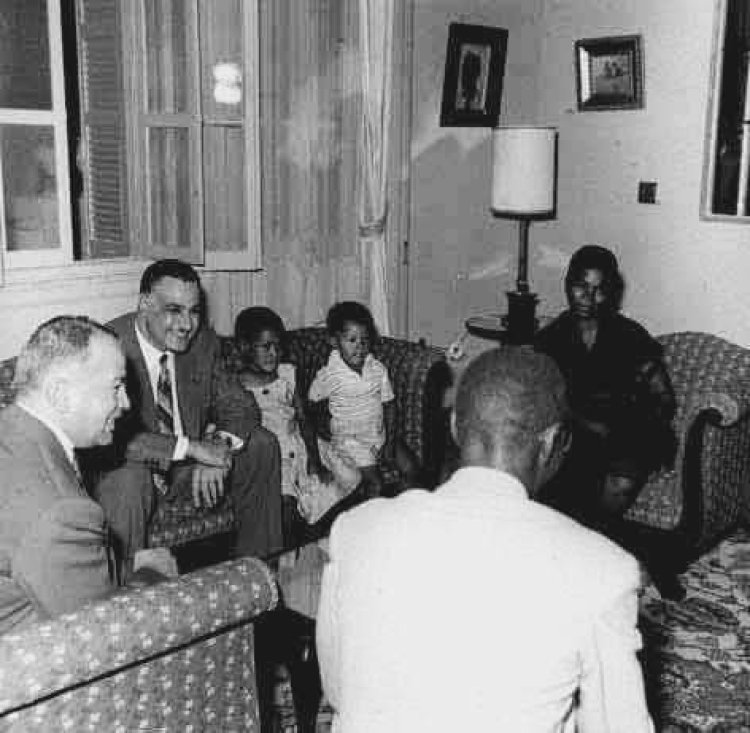CongoDRC Independence Day

Happy Independence Day, Democratic Republic of Congo
Egypt's Role in the Liberation of the Democratic Republic of Congo: Welcoming the Lumumba Family
The Democratic Republic of Congo celebrates its National Day today, a momentous occasion that commemorates its independence. On this day, it is essential to acknowledge the significant contribution of Egypt in the liberation struggle of the Congo and the warm reception extended to the Lumumba family, who played a pivotal role in the country's fight for freedom. In this article, we delve into Egypt's involvement in supporting the Congo's quest for independence and the subsequent relationship between the two nations.
Egypt's Support for Congo's Liberation:
The struggle for independence in the Democratic Republic of Congo, then known as the Belgian Congo, was a critical chapter in Africa's history. Patrice Lumumba emerged as a prominent figure and championed the cause of self-determination. Egypt, a country with its own rich history of fighting for independence, empathized with the Congolese people's aspirations and extended its support.
As Egypt witnessed its own struggle against colonial rule, it understood the significance of unity among African nations. Egypt's president at the time, Gamal Abdel Nasser, recognized Lumumba as a charismatic leader and a symbol of African independence. He pledged Egypt's backing to Lumumba and his quest for emancipation.
Egypt's Political and Diplomatic Efforts:
Egypt's support for the Congo's liberation was multi-faceted, encompassing political and diplomatic endeavors. President Nasser used his influence within the international community to advocate for the Congo's independence and shed light on the atrocities committed by colonial powers.
Moreover, Egypt played a crucial role in rallying support from other African countries, urging them to unite in their fight against colonialism. Nasser's charisma and leadership resonated with African leaders, inspiring them to take a stand against oppression. Through diplomatic channels, Egypt tirelessly worked to garner international recognition and support for the Congolese cause.
The Reception of the Lumumba Family:
After the tragic assassination of Patrice Lumumba in 1961, his family faced numerous challenges and sought refuge in several countries. Egypt, with its unwavering commitment to the ideals of Pan-Africanism, warmly received the Lumumba family.
Recognizing the significance of Lumumba's legacy and the ongoing struggle for independence in the Congo, Egypt provided sanctuary and support to the Lumumba family during their time of need. The Egyptian government ensured their safety and offered a platform for them to continue their advocacy for justice and self-determination.
Legacy and Continuation of Bilateral Relations:
The relationship between Egypt and the Democratic Republic of Congo remains rooted in shared history and the pursuit of a common goal. Egypt's support for Congo's independence continues to shape the bilateral ties between the two nations.
Since those pivotal years, Egypt and the Democratic Republic of Congo have maintained strong diplomatic relations, collaborating on various fronts, including trade, infrastructure development, and cultural exchanges. The warm reception extended to the Lumumba family symbolizes the enduring bond between the two nations and the shared commitment to the principles of freedom, justice, and self-determination.
Conclusion:
As the Democratic Republic of Congo celebrates its National Day, it is crucial to recognize the pivotal role Egypt played in supporting the country's struggle for independence. Egypt's political and diplomatic efforts, coupled with its warm reception of the Lumumba family, demonstrate a deep-rooted commitment to the principles of PanAfricanism and solidarity among nations striving for freedom. The relationship between Egypt and the Democratic Republic of Congo serves as a testament to the enduring bonds forged during historic liberation struggles and the shared aspirations of nations for a brighter future.
